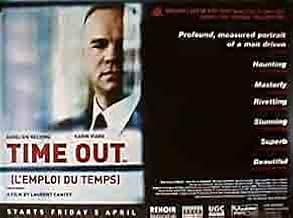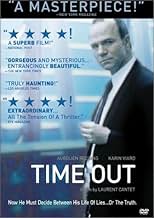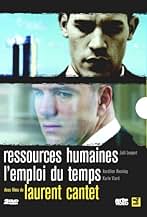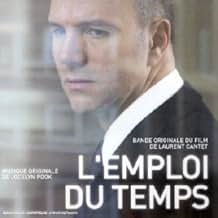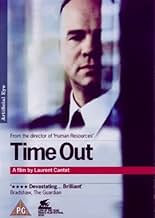CALIFICACIÓN DE IMDb
7.3/10
5.2 k
TU CALIFICACIÓN
Agrega una trama en tu idiomaAn unemployed man finds his life sinking more and more into trouble as he hides his situation from his family and friends.An unemployed man finds his life sinking more and more into trouble as he hides his situation from his family and friends.An unemployed man finds his life sinking more and more into trouble as he hides his situation from his family and friends.
- Dirección
- Guionistas
- Elenco
- Premios
- 3 premios ganados y 8 nominaciones en total
Didier Reyes
- Philippe
- (as Didier Perez)
- Dirección
- Guionistas
- Todo el elenco y el equipo
- Producción, taquilla y más en IMDbPro
Opiniones destacadas
A middle-aged middle class family man has a mid-life crisis.
Hardly an inspiring or original idea, yet Laurent Cantet creates a quite devastating and compelling landscape of one man's internal terror - terror at his situation and complete inability to express his feelings.
Through Cantet, a combination of economic script, astonishingly sparse and subtle performances, and Pook's deeply moving musical score, takes the viewer on a journey of displaced despair and futile attempts to paper over the cracks. Recoing is captivating, his face a turmoil of quiet bewilderment and pain, and he is ably matched by Viard as his increasingly unsettled partner. The penultimate scene between Recoing, Viard and their children is quite astonishing for its tension and disquiet.
In the end, however, the final scene says it all. Recoing's face tells us everything we need to know, and he really should have won every award going for this brilliant performance. Once again the French film industry shows us all how to make films.
Hardly an inspiring or original idea, yet Laurent Cantet creates a quite devastating and compelling landscape of one man's internal terror - terror at his situation and complete inability to express his feelings.
Through Cantet, a combination of economic script, astonishingly sparse and subtle performances, and Pook's deeply moving musical score, takes the viewer on a journey of displaced despair and futile attempts to paper over the cracks. Recoing is captivating, his face a turmoil of quiet bewilderment and pain, and he is ably matched by Viard as his increasingly unsettled partner. The penultimate scene between Recoing, Viard and their children is quite astonishing for its tension and disquiet.
In the end, however, the final scene says it all. Recoing's face tells us everything we need to know, and he really should have won every award going for this brilliant performance. Once again the French film industry shows us all how to make films.
TIME OUT (Laurent Cantet - France 2001).
The English language title Time Out is not entirely fitting. Perhaps Time Running Out would be a more appropriate title, since this is exactly what Vincent, the main character, is going through.
Vincent (Aurélien Recoing) is a highly motivated financial consultant. Or, at least, that's what he used to be. Fact of the matter is, he lost his job three months ago and now concocts an elaborate facade to cover up the fact he is now unemployed. While his wife, Muriel (Karin Viard), thinks he's at work, Vincent is aimlessly roaming the highways, hanging out at rest stops, and sleeping in his car, regularly calling his wife to give her an update about his next meeting and apologizing for coming home late, before turning in for his overnight stay in his car. Vincent lives like a ghost, increasingly detached from his wife, children and former colleagues, he doesn't seem to realize the truth is closing in. One day, they will find out. But Vincent has gotten to a point where he's constructed his own dream world. He resorts to reading all kinds of economic pamphlets about his apparent line of business, studying and memorizing them like he really is active in this line of work. As Vincent needs money, he makes up a plan to defraud old friends and his parents out of their savings by letting them in on some bogus investment scheme. He conducts his business out of a hotel lounge, where he catches the eye of Jean-Michel (Serge Livrozet, a brilliant role), a "real" , experienced operator who immediately recognizes Vincent is a fraud. He offers Vincent a job in his own operation, meaning some extra pocket money and perhaps even a way out of his increasingly sticky situation.
Director Cantet's style is distinctly unflashy. Set against the wintry landscapes of Rhône-Alpes around Grenoble and Annecy, the film makes very good use of its locations. Whether it's the bland office complexes in the "zones commerciales" at the outskirts of anonymous towns, or the snow-clad mountains surrounding them, it seems to blend perfectly with the film's tone. Accompanied by a beautiful classical score, Cantet shows himself a remarkably sharp and observant storyteller. Although the film maintains interest throughout, the running time of 132 minutes did seem a tad long, and Vincent's lengthy economic arguments when conning his friends and relatives (some of them business men themselves) out of their money weren't terribly convincing. His arguments range from unconvincing to downright nonsense. At least he would'n have convinced me, but even my 91 year old grandmother wouldn't have bought any of this for a moment. But, some of these inconsistencies aside, this is a skilfully constructed film and an engrossing psychological drama that slowly unfolds like a thriller with a brilliant performance by Aurélien Recoing to top it off.
Camera Obscura --- 8/10
The English language title Time Out is not entirely fitting. Perhaps Time Running Out would be a more appropriate title, since this is exactly what Vincent, the main character, is going through.
Vincent (Aurélien Recoing) is a highly motivated financial consultant. Or, at least, that's what he used to be. Fact of the matter is, he lost his job three months ago and now concocts an elaborate facade to cover up the fact he is now unemployed. While his wife, Muriel (Karin Viard), thinks he's at work, Vincent is aimlessly roaming the highways, hanging out at rest stops, and sleeping in his car, regularly calling his wife to give her an update about his next meeting and apologizing for coming home late, before turning in for his overnight stay in his car. Vincent lives like a ghost, increasingly detached from his wife, children and former colleagues, he doesn't seem to realize the truth is closing in. One day, they will find out. But Vincent has gotten to a point where he's constructed his own dream world. He resorts to reading all kinds of economic pamphlets about his apparent line of business, studying and memorizing them like he really is active in this line of work. As Vincent needs money, he makes up a plan to defraud old friends and his parents out of their savings by letting them in on some bogus investment scheme. He conducts his business out of a hotel lounge, where he catches the eye of Jean-Michel (Serge Livrozet, a brilliant role), a "real" , experienced operator who immediately recognizes Vincent is a fraud. He offers Vincent a job in his own operation, meaning some extra pocket money and perhaps even a way out of his increasingly sticky situation.
Director Cantet's style is distinctly unflashy. Set against the wintry landscapes of Rhône-Alpes around Grenoble and Annecy, the film makes very good use of its locations. Whether it's the bland office complexes in the "zones commerciales" at the outskirts of anonymous towns, or the snow-clad mountains surrounding them, it seems to blend perfectly with the film's tone. Accompanied by a beautiful classical score, Cantet shows himself a remarkably sharp and observant storyteller. Although the film maintains interest throughout, the running time of 132 minutes did seem a tad long, and Vincent's lengthy economic arguments when conning his friends and relatives (some of them business men themselves) out of their money weren't terribly convincing. His arguments range from unconvincing to downright nonsense. At least he would'n have convinced me, but even my 91 year old grandmother wouldn't have bought any of this for a moment. But, some of these inconsistencies aside, this is a skilfully constructed film and an engrossing psychological drama that slowly unfolds like a thriller with a brilliant performance by Aurélien Recoing to top it off.
Camera Obscura --- 8/10
Playing authority figures in dark suits, the actor Stellan Skarsgard always suggests a noble melancholy, a weatherbeaten soul underneath his Swedish-oil-exec good looks. William H. Macy has made a career out of essaying the disappointments of pride-in-professionalism white men. Aurelien Recoing, the hero of Laurent Cantet's L'EMPLOI DU TEMPS, doesn't summon the instant empathy we feel for those actors. Cantet is a schematist in the style of Arthur Miller: without Miller's cornballs, but also without his visceral punch. Recoing's very body seems to be a manifestation of Cantet's two-sided patness. From the front, Recoing has some of the bland, boyish-haired handsomeness of a Skarsgard or a young Klaus Maria Brandauer. From the back, balding and bearlike-hulking, Recoing is a monster or a wreck. Cantet's movies--old-school, slowly downhill-rolling tragedies about the inhumanity of late capitalism--use Jekyll-and-Hyde dichotomies for thudding dramatic effects.
Recoing's Vincent has lost his job as a management consultant. Instead of getting another one, he drives around, hangs out in office-building lobbies and hotel bars, and generally dresses and comports like an upper-middle-class Frenchman. When he starts dreaming up a fantasy job--bringing bucks to developing markets in the Third World via the U.N.--he starts taking money from all-too-eager friends to invest. Then a middle-class mobster is onto Vincent's scheme. And from there...before you can say FARGO, the cards come tumblin' down.
Like Cantet's last movie, HUMAN RESOURCES, we are meant to hate the game, not the player, and to believe that a rigged, soulless system has robbed Cantet's characters of their capacity to experience joy on earth. But what does this character want, exactly? At one moment, he seems to genuinely wish he had the idealistic U.N. job--something, at his stage of life, with his background in the for-profit world, he could never attain. At other moments he seems to want to drive around the snowy countryside and listen to golden oldies. At still others, he seems to enjoy, a la Kevin Spacey in AMERICAN BEAUTY, the undemanding work of selling hot stereos and toasters for his mafia friend. And yet Cantet has designed the movie to make it seem as if the need for status, for patriarchal prestige, has led Vincent into the fantasy land that is his undoing. The ending--a softer landing than you might be expecting--is meant to be soul-chilling.
But what's the big whip? Everyone has dreamed of a life of aimless rambling; those who have it never seem very happy with it. (Cantet could've tested his ideas if he had bought Vincent a ticket to a lazybones' paradise.) And Cantet underlines the irony that Vincent's hustling to keep himself in non-work is in itself a more than full-time job. Cantet's movies struggle for a Miller-like inevitability, but they always fail to persuade on a human level; his crushed heroes seem more constructs than creatures. One brilliantly observant (and shudder-inducingly cruel) moment: Vincent's wife catches on to his ruse when he brings a buddy from the office to dinner--a pockmarked hustler who is too low-class to inhabit the highflown world Vincent pretends to have a berth in. The jig is up for Vincent because his wife's snob meter goes off. Too bad nothing else is as acutely examined or observant.
Recoing's Vincent has lost his job as a management consultant. Instead of getting another one, he drives around, hangs out in office-building lobbies and hotel bars, and generally dresses and comports like an upper-middle-class Frenchman. When he starts dreaming up a fantasy job--bringing bucks to developing markets in the Third World via the U.N.--he starts taking money from all-too-eager friends to invest. Then a middle-class mobster is onto Vincent's scheme. And from there...before you can say FARGO, the cards come tumblin' down.
Like Cantet's last movie, HUMAN RESOURCES, we are meant to hate the game, not the player, and to believe that a rigged, soulless system has robbed Cantet's characters of their capacity to experience joy on earth. But what does this character want, exactly? At one moment, he seems to genuinely wish he had the idealistic U.N. job--something, at his stage of life, with his background in the for-profit world, he could never attain. At other moments he seems to want to drive around the snowy countryside and listen to golden oldies. At still others, he seems to enjoy, a la Kevin Spacey in AMERICAN BEAUTY, the undemanding work of selling hot stereos and toasters for his mafia friend. And yet Cantet has designed the movie to make it seem as if the need for status, for patriarchal prestige, has led Vincent into the fantasy land that is his undoing. The ending--a softer landing than you might be expecting--is meant to be soul-chilling.
But what's the big whip? Everyone has dreamed of a life of aimless rambling; those who have it never seem very happy with it. (Cantet could've tested his ideas if he had bought Vincent a ticket to a lazybones' paradise.) And Cantet underlines the irony that Vincent's hustling to keep himself in non-work is in itself a more than full-time job. Cantet's movies struggle for a Miller-like inevitability, but they always fail to persuade on a human level; his crushed heroes seem more constructs than creatures. One brilliantly observant (and shudder-inducingly cruel) moment: Vincent's wife catches on to his ruse when he brings a buddy from the office to dinner--a pockmarked hustler who is too low-class to inhabit the highflown world Vincent pretends to have a berth in. The jig is up for Vincent because his wife's snob meter goes off. Too bad nothing else is as acutely examined or observant.
Shakespeare spoke of the tangled web of deceit suggesting it was a terrible trap. Laurent Cantet presents us with another view. His hero in this film, Vincent (played to perfection by Aurelien Recoing) appears to revel in the freedom his dissembling brings...at least for a time. A middle-aged, middle class man who has lost his job keeps this information from his family and sets out on a complex journey of survival, both existentially and financially, involving schemes that he eventually has ambivalent feelings about. We also see another side to this complex man...the loving husband, father and son. Are we to judge and dislike this man? Should we cast the first stone?
I was particularly impressed by the subtle way Cantet depicted Muriel, Vincent's wife (performed with sensitivity and grace by Karin Viard). Her suspicions and uncertainties are written only on her lovely face...very little is ever said. And yet she's not seen as the long-suffering little woman...not at all. She appears independent and strong.
And then there's the affecting scenes in the snow-filled mountains... in that place of isolation (so representative of...well...of us all). There's majestic beauty and danger.
The mystery, the thought=provoking qualities of this film have made it for me a haunting and moving experience...One that I'd certainly recommend!
I was particularly impressed by the subtle way Cantet depicted Muriel, Vincent's wife (performed with sensitivity and grace by Karin Viard). Her suspicions and uncertainties are written only on her lovely face...very little is ever said. And yet she's not seen as the long-suffering little woman...not at all. She appears independent and strong.
And then there's the affecting scenes in the snow-filled mountains... in that place of isolation (so representative of...well...of us all). There's majestic beauty and danger.
The mystery, the thought=provoking qualities of this film have made it for me a haunting and moving experience...One that I'd certainly recommend!
This is a purely awesome film, the best of Laurent Cantet, the movie that reavealed him, and the best role ever from Aurélien Recoing. This is inspired from actual events,a nd this very same story was remade one year later with Daniel Auteuil: L'ADVERSAIRE. Both are terrific but not sjown in the same manner. The 2002 film from Nicole Garcia was more criminal oriented. Here, you are glued, stuck to this riveting tale. You always wonder what will happen in the next scene. An outstanding drama, involving normal folks to whom happens something really terrible. Top of the top. One of the best dramas ever. Serge Livrozet, this non professional actor, gives here a jaw dropping short but unique performance. The amazing story of a man more and more prisoner of his own lies.
¿Sabías que…?
- TriviaInspired by a true story, that of Jean-Claude Romand. In reality, Romand went on to kill, on January 9, 1993, his wife, two children and both his parents. It is the first of three films in two years inspired by the case, followed by L'adversaire (2002) and La vida de nadie (2002), of which the former is the closest to the real events. Phantom (2002) was also inspired by the same incident.
- ConexionesFeatured in The 2003 IFP Independent Spirit Awards (2003)
- Bandas sonorasL'Emploi Du Temps - Musique Originale
Composed by/ Arranged By Jocelyn Pook
Performed by 'Electra Strings' Ensemble
Cello Solo performed by Sophie Harris
Viola Solo performed by Clive Howard
Violin solo performed by Jacqueline Norrie
Phonographic Copyright (p) Jocelyn Pook / Haut et Court
Under Exclusive License To Virgin France
Published By Chester Music Ltd.
© 2001 Virgin France
Selecciones populares
Inicia sesión para calificar y agrega a la lista de videos para obtener recomendaciones personalizadas
- How long is Time Out?Con tecnología de Alexa
Detalles
Taquilla
- Total en EE. UU. y Canadá
- USD 448,542
- Total a nivel mundial
- USD 1,213,913
- Tiempo de ejecución
- 2h 14min(134 min)
- Color
- Mezcla de sonido
- Relación de aspecto
- 1.85 : 1
Contribuir a esta página
Sugiere una edición o agrega el contenido que falta




